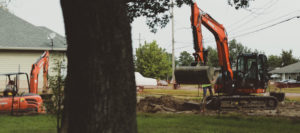
A construction performance bond is a great way to add extra financial security to a project. However, in order to have a proper claim against the surety bond, close attention should be given to the procedural requirements in the bond agreement. Any missteps in the notice procedures could spell disaster for a contractor attempting to make a claim. A recent case out of DC resulted in the dismissal of a performance bond claim due to a late notice of default.
Performance bond claims
Performance bonds are a type of surety bond, posted by a contractor, to ensure the proper completion of the contract. Here’s how it works: If a party on the project is unable or fails to perform, the surety will step in and either pay the additional costs to complete the work, or provide a replacement contractor to finish the contract.
As with every contract, any construction bond holds the contractor to certain obligations and notice requirements. Failing to follow the terms can cause the contractor to forfeit their rights under the performance bond. A contractor who provides late notice can lose their right to make a bond claim.
Contractor fails to provide notice of default to the surety
The case in question is Western Surety Co. v. U.S. Engineering Construction, LLC
Project Snapshot:
- Owner: Republic of South Africa (RFSA)
- General contractor: Turner Construction Co. (Turner)
- Subcontractor: U.S. Engineering Construction, LLC (US Engineering)
- Sub-Subcontractor: United Sheet Metal, Inc. (USM)
- Surety: Western Surety Company (Western Surety)
Turner contracted with the RFSA for the construction of a new embassy in DC. Turner hired US Engineering as a subcontractor, who in turn hired USM for the installation of sheet metal for $585K.
Terms of the performance bond
US Engineering posted a performance bond, underwritten by Western Surety Company (Western Surety), using a standard AIA A321-2010 performance bond form. There are two relevant provisions of the AIA performance bond form at issue in this case:
§3.1: If there is no Owner Default under the Construction Contract, the Surety’s obligation under this bond shall arise after (1) the Owner first provides notice to the Contractor and the Surety that the Owner is considering declaring a Contractor Default…
§4: Failure on the part of the Owner to comply with the notice requirements of Section 3.1 shall constitute a failure to comply with a condition precedent to the Surety’s obligations, or release the Surety from its obligations, except to the extent the surety demonstrates actual prejudice.
Sub-subcontractor terminated for unsatisfactory performance
As the project progressed, USM began to have difficulties with performance. In response, Turner (the GC) sent a notice to US Engineering that the delay costs caused by US Engineering or its subcontractors would be charged to them. US Engineering forwarded this notice to USM as a “formal notice to correct,” stating that they had 72 hours to “demonstrate performance improvement.” USM failed to do so. Therefore, US Engineering terminated USM’s subcontract without sending any notice to Western Surety beforehand.
A little over 8 months later, US Engineering filed a notice of claim against the bond. This also happened to be the first time Western Surety was informed of USM’s default. In response, Western Surety filed a motion for summary judgment. They based their motion on the fact that US Engineering didn’t provide timely notice under the terms of the bond.
The court agreed with Western Surety and granted the motion. US Engineering appealed.
Appeal court: Surety isn’t liable if the contractor provides late notice
On appeal, US Engineering argued that the bond doesn’t provide a timeframe for providing such notice. It merely requires notice of the default and termination, not notice early enough to allow Western Surety to participate in every opportunity to cure.
The court rejected this argument. The bond expressly provides the surety with an opportunity to participate in the curing of the subcontractor’s default. When US Engineering failed to provide a notice of default, it never triggered Western Surety’s obligation under the bond. Accordingly, the appeals court affirmed the decision to grant Western Surety’s motion for summary judgment.
Be sure to comply with surety bond notice provisions
Anytime a contractor posts a performance bond, it’s a good idea to understand all the terms of the bond before taking any action or claims. It’s particularly important to review the notice requirements. Many performance bonds require that the contractor give the surety an opportunity to cure the default. Even if, as in this case, there’s no specific timeframe provided to do so.
Failing to provide notice, as US Engineering did, can leave the contractor who posted the bond liable for any extra costs incurred. Costs that would the surety would normally cover.